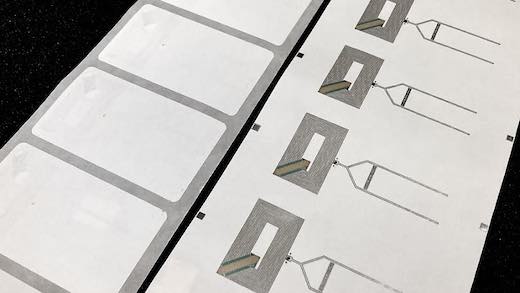Toppan Launches Sales of Eco-friendly NFC Tag Label with Paper-based Antenna Substrate
Press release from the issuing company

Eco-friendly NFC tag label (left) and paper-based antenna substrate (right) © TOPPAN INC.
Communication performance equivalent to products using plastic film achieved with new circuit fabrication technology and fraudulent reattachment prevented by antenna breaking when label is removed.
Tokyo – Toppan, a global leader in communication, security, packaging, décor materials, and electronics solutions, has developed an eco-friendly near-field communication (NFC) tag label that uses paper material as the substrate for the antenna instead of conventional polyethylene terephthalate (PET) film. Global sales of the new tag label have been launched today, with Europe expected to be a promising market due to the high level of environmental consciousness.
In addition to reducing plastic consumption to zero by switching to paper, a new circuit fabrication technology ensures sufficient communication performance as an NFC device. Taking advantage of the properties of paper as a substrate, the NFC tag label is designed to break when it is removed, making communication impossible and thereby preventing fraudulent use due to reattachment of labels.
The value of the global NFC tag market hit US$3.8 billion in 2020 and is expected to reach US$15.5 billion by 2030.1 In addition to increased use in contactless payment systems and supply chain management, this is driven by factors including more social distancing as a result of the COVID-19 pandemic.
NFC tag labels are predominantly produced by using metal foil to form an antenna on a plastic substrate, such as PET film. As governments and businesses advance activities to move away from the use of plastic, the market for NFC tags is seeing growing demand for replacing plastic with paper materials that have lower environmental impact. However, achieving sufficient communication performance has been challenging because the electrical resistance of circuits increases when printing methods employing conductive inks, such as widely-used silver nanoparticles, are used to form antennas on paper.
“Toppan’s new NFC tag label meets growing demand for more eco-friendly solutions as the NFC market expands globally,” said Takamitsu Nakabayashi, general manager of RFID/IoT and security development in Toppan’s DX Design Division. “We will expand sales globally, focusing particularly on the European market, where measures focused on reducing environmental impact are gathering pace.”
Features
Plastic-free with communication performance equivalent to conventional products
Aluminum foil with low electrical resistance is used to form an antenna on a paper substrate via a new circuit fabrication technology combining laser edge technology with a roll-to-roll web handling process. This eliminates plastic from the NFC tag while maintaining the required communication performance. If a paper substrate is used instead of a PET film substrate for a million standard size NFC tag labels (80 mm x 45 mm), consumption of plastic resin can be reduced by approximately 110 kilograms.
Label thickness reduced by 30% due to reduction of constituent materials
Due to a layer structure in which the paper substrate doubles as the surface layer material, the new eco-friendly NFC tag label is 30% thinner than Toppan’s existing products with PET film substrates. This means that documents or the like to which NFC tag labels have been attached do not become bulky when stacked.
*Lamination of a separate printed layer is required when applying color printing to the label surface.
Brittleness of paper material helps to prevent fraudulent reattachment
The eco-friendly NFC tag label has been designed to break, making communication impossible, when an attempt is made to remove it from an item to which it has been attached. This enhances security by preventing fraudulent use via reattachment.
Price
Price is similar to that of NFC tag labels using PET substrates. Separate quotations are required when color printing is applied to the surface.
1. Source: Allied Market Research 2021
For more information, visit https://www.toppan.com/en/.
© 2025 WhatTheyThink. All Rights Reserved.













